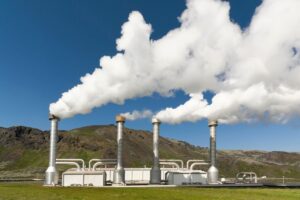Writer: Caty Hirst
 2 min read February 2022 — Geothermal energy could become a top source of energy for Philadelphia as city leaders seek to pivot away from fossil fuels and coal, according to discussions at a Philadelphia City Council meeting and a new report published by Philadelphia Gas Works.
2 min read February 2022 — Geothermal energy could become a top source of energy for Philadelphia as city leaders seek to pivot away from fossil fuels and coal, according to discussions at a Philadelphia City Council meeting and a new report published by Philadelphia Gas Works.
Geothermal, a renewable source of energy powered by the thermal energy in the Earth’s crust, has made headlines as a potential top source of clean energy in countries from Iceland to Kenya, but its use in the United States is as of yet not fully tapped: just 0.4% of the U.S. energy supply comes from geothermal sources, according to the Center for Sustainable Systems. Still, geothermal has been proven a strong source of power, with 85% of all of Iceland’s power capacity run by geothermal plants, according to government data.
It is already powering several buildings throughout Pennsylvania, including the Ronald McDonald House located in West Philadelphia, as well as Philadelphia’s police academy, according to WHYY PBS.
Still, geothermal has a long way to go before it leads in energy production in Pennsylvania, including getting buy-in from critics, feasibility studies on geothermal hot spots and construction of expensive infrastructure to create a geothermal network.
Pennsylvania is already the second-largest producer of natural gas in the United States, only behind Texas, and produced 7.1 trillion cubic feet of natural gas production in 2020, according to the Energy Information Agency. Additionally, Pennsylvania is the third-largest coal-producing state, only after Wyoming and West Virginia, and is the second-largest coal exporter. In 2019, natural gas was far and above the leading source of energy for Pennsylvanians at 1.679 trillion British thermal units (BTUs), followed by nuclear power, coal and gasoline. Geothermal, included in the category “other renewables” in the EIA ranking, made up some level of 37 trillion BTUs in that category for the state.
Geothermal is listed as a renewable energy source in the city of Philadelphia’s Clean Energy Vision, produced by the city’s Office of Sustainability. But the business diversification study produced by the city’s Philadelphia Gas Works released in December shows that while such diversification is a possibility, “this solution is likely to require significant capital investments and regulatory analysis.” The report finds that “more study is needed to assess the exact costs and feasibility of the concept in Philadelphia.”
“Because the costs of networked geothermal systems are highly dependent on local (geological) conditions and load density, the possibility of establishing them is uncertain in the Philadelphia context,” the report further stated, adding that geothermal systems are relatively expensive to install and are also on average more expensive than gas networks.
As an example, European distribution costs of geothermal range from $15-$37 per MMBtu, compared to $7.5 per MMBtu for the gas delivery networks already established in Philadelphia. Despite the unknowns and higher costs, the energy diversification report moves forward with geothermal as a new energy method to explore for PGW, as well as weatherization and the collection of landfill gas. In the weatherization program, the city should work with low-income and moderate-income consumers about new weatherization updates, including home insulation. For geothermal, PGW recommends a feasibility study be conducted for networked geothermal systems, including examining the geological potential and the financial model for the system. Finally, PGW could work with other departments, including Streets and the Water Department, to convert waste into biomethane.
The shift to renewables from fossil fuels will not be an easy transition for Philadelphia, despite a goal of becoming a carbon neutral city by 2050. Questions also surround Philadelphia owning its own gas utility — a conflict of interest in terms of going net neutral, critics argue.

